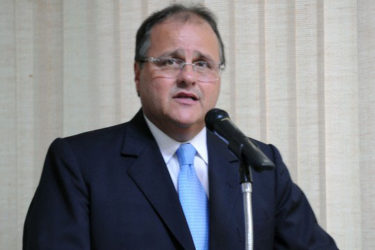BRASILIA, (Reuters) – One of Brazilian President Michel Temer’s closest aides resigned yesterday following allegations he pressured the culture minister to approve a property development, unsettling investors with the prospect of renewed political turmoil in Latin America’s largest economy.

The resignation of Geddel Vieira Lima from the key post of minister in charge of relations with Congress -along with accusations that Temer himself also lobbied Culture Minister Marcelo Calero to approve the luxury development – sent Brazil’s currency and stocks lower.
An announcement by the public prosecutor’s office that it was considering whether to open an investigation also stoked concern that the fallout from the scandal could derail efforts by Temer’s centre-right government to tackle’s Brazil massive budget deficit and restore economic growth.
“It’s time to go,” Vieira Lima said in his emailed resignation letter made public by Temer’s office.
Vieira Lima’s departure deprives Temer of his point man in negotiations with Congress, a crucial post as the administration strives to enact unpopular austerity measures and spur recovery in an economy suffering its worst recession since the 1930s.
Temer’s six-month-old government has lost five Cabinet ministers. Calero resigned last week saying he refused to bow to Vieira Lima’s pressure.
Previously, three Cabinet ministers stepped down over graft allegations related to a sprawling bribery and kickback scandal at state-controlled oil company Petroleo Bra-sileiro.
Temer played down the incident in an interview with O Estado de S.Paulo newspaper in which he lamented that a “minor episode” had caused a political storm and said he doubted it would lose him vital support in Congress for his fiscal belt-tightening agenda.
Leftist opponents have called for a congressional inquiry into Temer’s role in the matter, with some even calling for his impeachment. While that is unlikely to happen, the new scandal will further undermine the reputation of an unpopular president and fuel political uncertainty that could delay a recovery that is already taking longer than expected.
The problem for Temer is that this happened at a difficult time when the economy is not reacting and Brazilians are angry with politicians trying to escape prosecution for corruption,” said political analyst Ricardo Ribeiro with consultancy MCM Consultores Associados.
“It creates doubts about the future of this government next year,” he said.
Brazil’s political establishment is bracing for more turmoil from a leniency deal to be signed by engineering conglomerate Odebrecht SA in the Petrobras case that could incriminate as many as 200 lawmakers.
The Brazilian real slumped as much as 2.2 percent to 3.4679 reais to the dollar, the biggest intraday drop since a day after U.S. President-elect Donald Trump’s unexpected victory. It recovered to close 0.3 percent lower.
Brazil’s main stock market index, the Bovespa, fell 1.3 percent before cutting losses to close 0.27 percent lower.
The latest corruption crisis came to a head following news reports late on Thursday that Calero told federal police that Temer pressured him to resolve a dispute with Vieira Lima.
The standoff involved a permit for construction of a luxury oceanfront building in which Vieira Lima had purchased an apartment and that needed approval by a culture ministry agency because it would be built in a historical preservation district in Vieira Lima’s hometown of Salvador.
After Brazil’s public prosecutor’s office said it was studying a possible investigation into the case, a presidential aide told Reuters early Friday that Vieira Lima’s situation had become untenable.
Adding fuel to the crisis, the Estado de S. Paulo newspaper reported on Friday that Calero secretly recorded his conversations with Temer and Vieira Lima to back his case.
A presidential ethics panel decided on Monday to investigate whether Vieira Lima pressured Calero over the building.
The 30-story building project had already been denied a permit on historical preservation grounds.
A federal police source with knowledge of the statements said Calero told police that Temer had said to him last week that the permit refusal had created “operational





